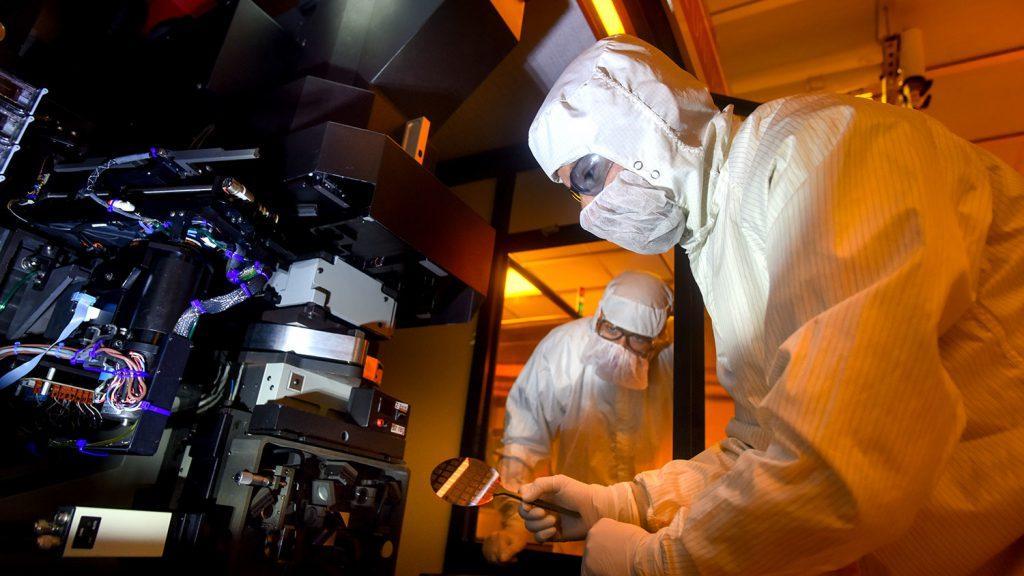
The NC State Nanofabrication Facility (NNF) and the Analytical Instrumentation Facility (AIF) provide the kind of core shared resources that help make a research-intensive university like NC State create innovation.
NNF is a Class 100/Class 1000 cleanroom that provides semiconductor processing capabilities, while the AIF is NC State’s primary shared facility providing access to major analytical and materials characterization instrumentation like scanning electron microscopes and X-ray units.
While both facilities are part of the College of Engineering and are used regularly by students and faculty members in the College, they also provide important capabilities to researchers in textiles, physics, chemistry and other programs on campus. NNF and AIF are two of five such research centers identified by NC State as vital Shared Core Research Facilities that are central to the University’s mission.
“Facilities like NNF and AIF are set up so that there is one facility where all professors in the University, all students and post docs, can go to share the equipment and not have to shoulder the burden of maintenance, infrastructure and tool upkeep,” said NNF Director of Operations Dr. Philip Barletta. “It also serves as a melting pot where researchers from a number of disciplines and backgrounds can work together, share ideas and inspire each other.”
Along with on-campus users, the two centers are made available to clients in business and at other academic institutions. Growing that client base is a revitalized focus for NNF, which has recently upgraded its equipment and space and has grown the size and expertise of its staff, thanks to new investments from the Department of Electrical and Computer Engineering (ECE), the College of Engineering and the University. Barletta, hired in 2017, is NNF’s first full-time director.
At the same time, leaders of both AIF and NNF are working to expand access to their centers, transforming them into resources that are broad in scope and global in reach.
“It’s not just about having such facilities that are available for use,” said Dr. Jacob Jones, AIF director and professor in the Department of Materials Science and Engineering. “It’s about reaching out and promoting these state-of-the-art capabilities to global researchers.”
A wide range of clients
NNF possesses a full range of micro- and nano-fabrication capabilities, including photo and electron beam lithography, wet and dry etch, chemical vapor deposition, vacuum metallization, rapid thermal anneal and various characterization tools. The center is capable of processing on a broad range of substrates such as semiconductors, ceramics, plastics and glass with sizes from small pieces to six-inch wafers.
For clients that range in size from small start-ups to large international companies, NNF offers vital capabilities that would be cost-prohibitive to have in-house. Their projects include micro-electro-mechanical machines for sensing, microfluidics for biomedical applications and non-silicon-based microelectronics.
Of 107 individual users of NNF’s facilities during the 2016-17 fiscal year, 15 were from outside NC State. That’s a number Barletta hopes to increase.
AIF offers users state-of-the-art scanning and transmission electron microscopes, X-ray scattering and spectroscopy instruments, mass spectrometry, scanning probe and Raman microscopy, nanoindentation and extensive sample preparation facilities.
Its advanced capabilities include chemically sensitive atomic-scale imaging, extreme-resolution SEM of insulating and soft materials, in-situ high-temperature and electric-field-dependent X-ray diffraction and cryogenic SEM of biological and soft materials.
In addition to the several hundred NC State researchers served by AIF during fiscal 2016-17, the center served 127 external government, industrial and academic researchers, or 25 percent of all AIF lab-use hours during that period.
AIF has created a Corporate Affiliates Program to help strengthen ties to outside academic and business clients. Through financial support of the center, members of the program receive increased access to the AIF’s services and expertise.
AIF and NNF are also part of a National Science Foundation-supported National Nanotechnology Coordinated Infrastructure (NNCI). The local site in the NNCI, the Research Triangle Nanotechnology Network (RTNN), has many programs geared toward serving outside clients. For example, RTNN’s Kickstarter program provides facility access to members of the nanotechnology and greater scientific communities who would otherwise not have the financial resources to use RTNN facilities.
Beyond the lab
ECE offers two classes that take place in NNF — one undergraduate level and one graduate level — in which students learn to make transistors. Education is also central to the mission of AIF. During 2016-17, the facility offered training workshops and short courses on topics including vacuum technology, surface analysis and sample preparation.
For the two centers, the next step is to further expand their reach to those outside the Research Triangle area of North Carolina and outside of technical fields.
Through RTNN — an NC State-led initiative designed to provide public access to University facilities, tools and expertise within all disciplines of nanoscale science, engineering and technology — faculty members in the College of Engineering, Duke University and UNC-Chapel Hill are offering a free online course called Nanotechnology: A Maker’s Course.
The course, available through the Coursera online platform, opens a wealth of opportunities for students, entrepreneurs and business people to learn about and use machinery involved in making high-tech products and studying materials on a molecular scale.
In the first few months after the course was released, it had seen more than 10,000 visitors and several thousand students were enrolled. The creators hope to have tens of thousands enrolled students annually.
“We’ve got a large swath of wonderful resources here at NC State that are available to the world,” Jones said.
Return to contents or download the Spring/Summer 2018 NC State Engineering magazine (PDF, 3MB) along with the insert about Fitts-Woolard Hall (PDF, 479KB).